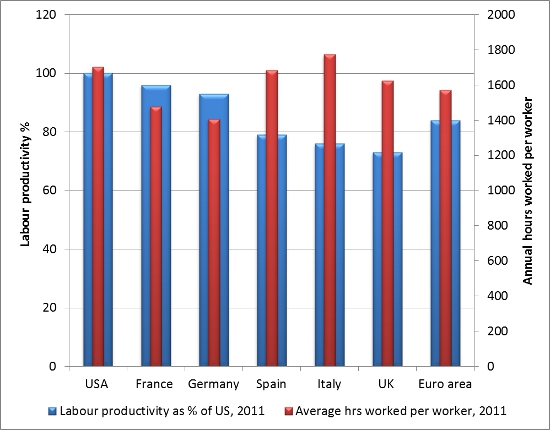Contrary to national stereotypes, French workers are more productive than their German counterparts and only marginally less productive than American workers.
Recently, the CEO of a US manufacturer commented that his company would not invest in a factory in France due to concerns over the productivity of local workers. Surprised by these comments, Bob Hancké looked into statistics across Europe for labour market productivity and hours worked. He finds that French workers are nearly as productive as their American counterparts, and even more so than workers in Germany.
A few days ago, the Financial Times and the Guardian reported, both rather uncritically, that the CEO of the US tyre manufacturer Titan International, Maurice Taylor, had lashed out against French workers and labour unions in a letter to the French financial newspaper Les Echos de la Bourse.
His not particularly flattering assessment involved such epithets as lazy (for the workers) and stupid (addressed to the unions), and he asked ‘how crazy do you think we are?’ In essence, the piece suggests that the strong trade unions in France are keeping labour productivity and therefore economic growth down: Taylor reports that when he spoke with French workers last year, they told him that three hours of work per day is ‘the French way’.
I always enjoy reading the rants of American CEOs. Usually the CEO is not hindered by an absence of facts about how European economies actually work, beyond hand-picked anecdotes for the bad news, and textbook-based comments for the worst news.
But in this particular instance, I must admit that I was also a bit surprised about the sudden turn for the worse in French labour productivity. When I became a student of the French economy almost twenty years ago, possibly the most remarkable turnaround in the French economy during the late 1980s and early 1990s had been its stable increase in labour productivity.
Off I went, therefore, to the OECD Statistics website to find out what had happened. In the figure below, the blue columns list the GDP per hour worked as a percentage of that of the US in the year 2011 for a handful of countries.
The smaller red columns show the average total hours worked per year per worker in 2011. I included the UK and the US as Mr Taylor’s preferred places for doing business, France for the opposite reason, Germany because it is considered the economy that everyone should aspire to become, and the large southern European economies that are, by most accounts, facing the deepest problems today.

Figure 1 – Labour productivity and average hours worked
French workers, as these figures show, did not suddenly fall prey to the Club Med syndrome and take, as Taylor suggests, two-thirds of their working day off. The country’s hourly labour productivity is almost on a par with the US.
Surprisingly, at least for those who don’t bother to check the facts, the total number of hours worked is also higher than those of highly industrious Germany. Perhaps Mr Taylor stumbled on a group of particularly grumpy French workers, but the aggregate statistics leave little doubt that the French are still grafting away.
What was perhaps even more surprising to me when I looked at these figures was that the average number of hours worked per year in Italy and Spain, two countries that have suffered quite significantly in the current EMU crisis and are treated as lazy pariahs, are higher than, or almost as high as those in the US. Their problem, these numbers suggest, is labour productivity, not laziness. And that puts the ball in the court of government (think education) and business (think investment and technology). The UK, by the way, seems stuck in a similar low-productivity trap.
Mr Taylor’s outburst about the lack of economic viability in France has found echoes in other business publications, such as The Economist, with almost mind-numbing regularity.
It highlights the important point in this debate that there are many ways to be wrong. As far as the supply-side of the economy is concerned, pointing the finger at wages and lazy workers is just plain stupid. The main responsibility lies elsewhere.
fonte